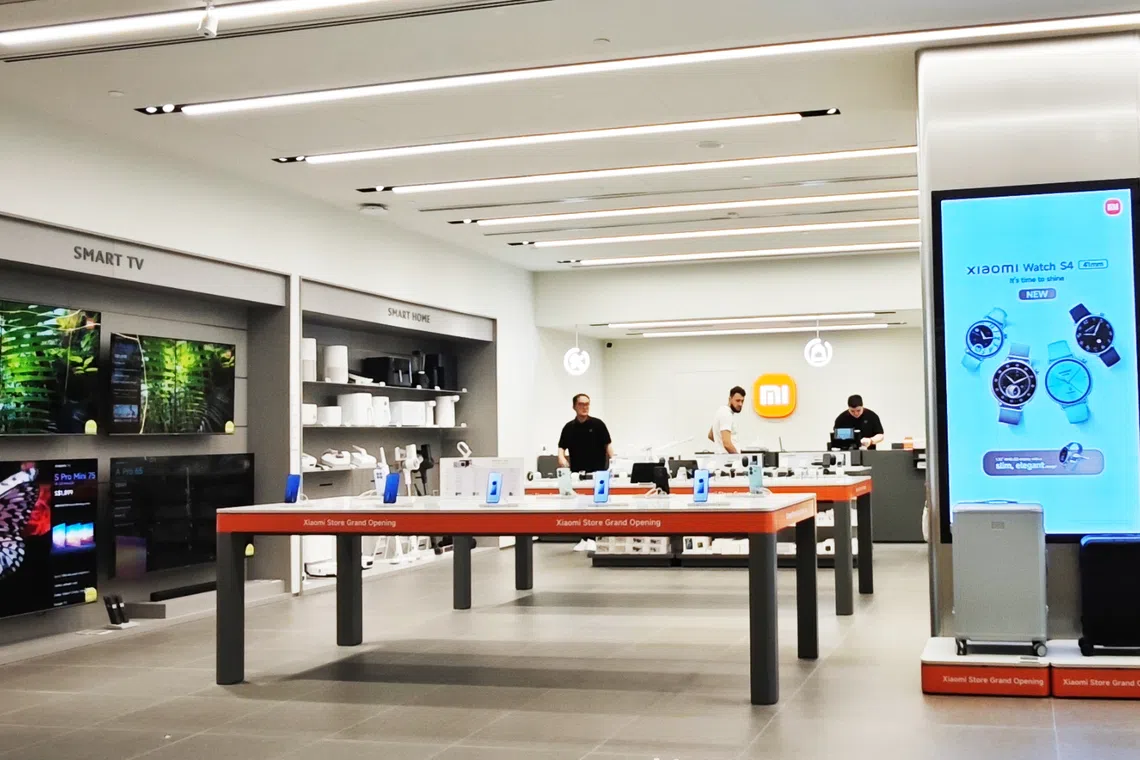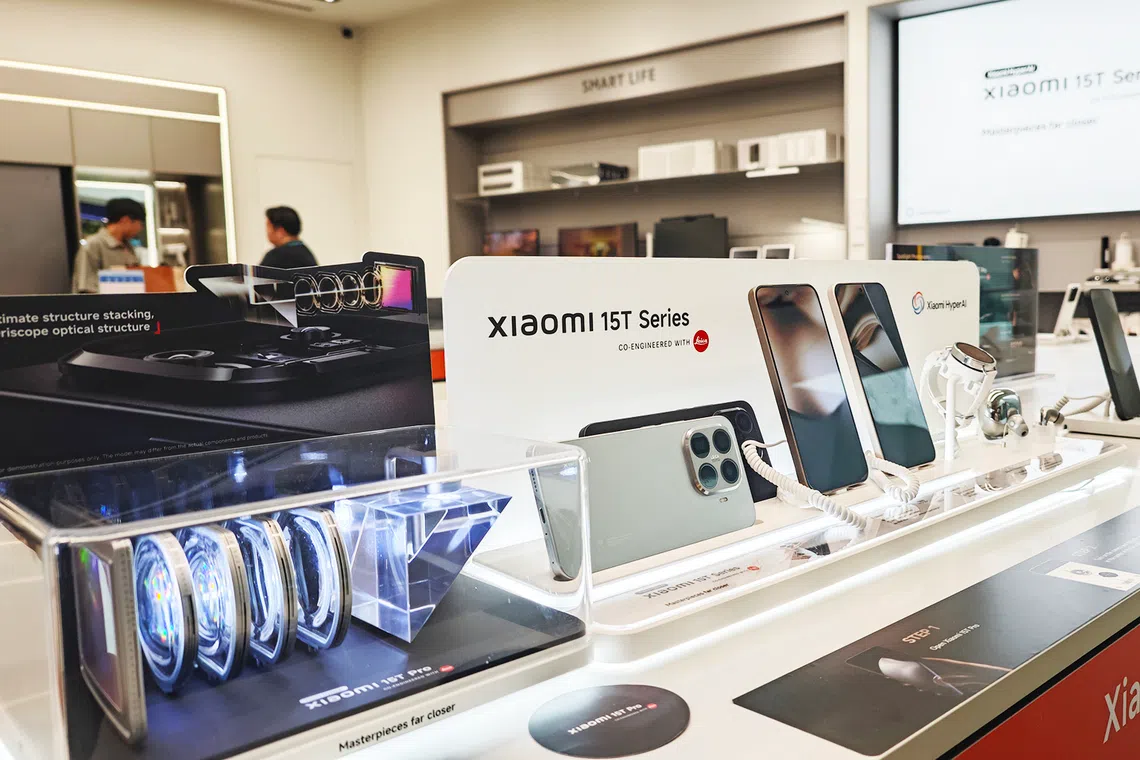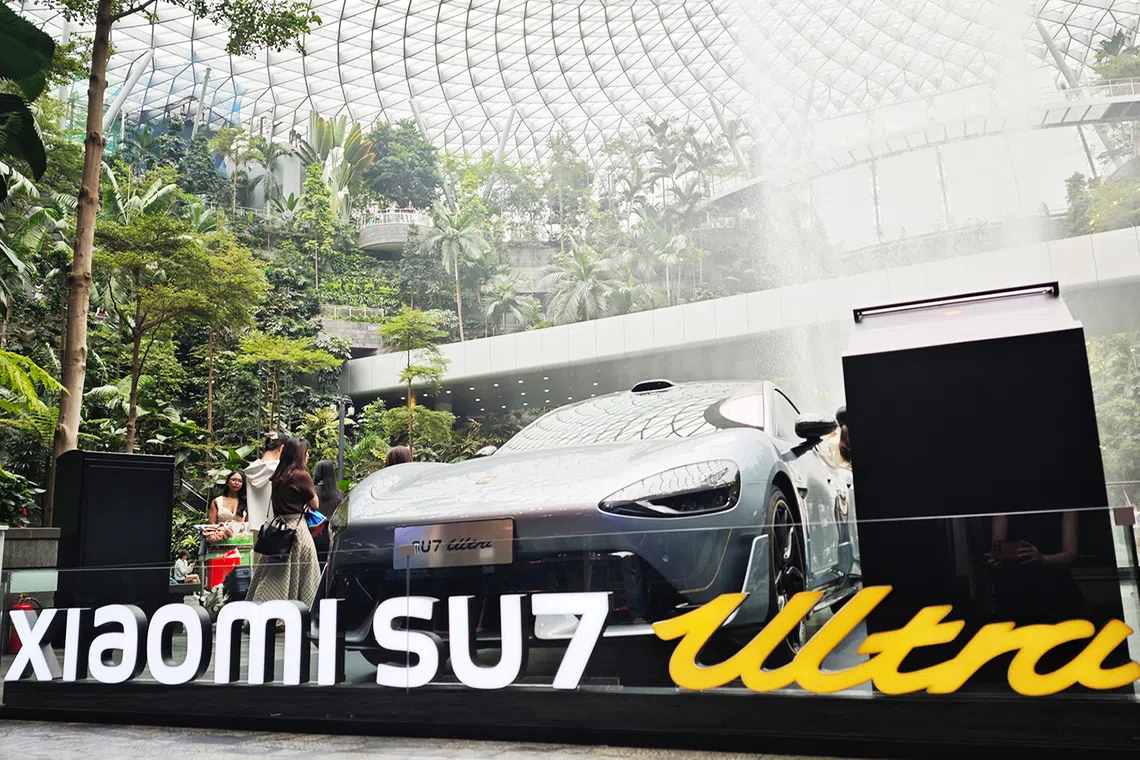S$18 billion spent on R&D: Inside Xiaomi’s push from affordable smartphones to premium EVs
The Chinese tech giant has spent years perfecting its AI-driven ecosystem of connected products as it positions itself as a premium technology leader
AS Xiaomi Corp opens the doors of its new store at Jewel Changi Airport on Oct 11, visitors can expect an eye-catching display: a sleek electric sedan displayed in front of Jewel’s Rain Vortex. While the Xiaomi SU7 Ultra is not for sale in Singapore, its presence signals an ambitious transformation underway at the Chinese tech group.
That transformation is being powered by an unprecedented investment in research and development (R&D). The company, which once competed primarily on price, is now investing over 100 billion yuan (S$18.2 billion) in innovation.
Since 2020, Xiaomi’s global team of more than 22,000 engineers has been developing proprietary chips, artificial intelligence (AI) systems and operating platforms – the technological backbone for what it calls its Human × Car × Home ecosystem. This initiative aims to integrate personal devices, vehicles and household products into a seamless intelligent lifestyle.
For Xiaomi vice-president and chief marketing officer Xu Fei, this strategy defines the company’s long-term growth. “‘Human’ refers to personal devices like smartphones, wearables and AI assistants. ‘Car’ represents intelligent mobility, while ‘Home’ is the connected living environment. By integrating these three, we want to create a people-centred ecosystem that delivers a seamless intelligent lifestyle,” she says.
“Premiumisation for Xiaomi isn’t simply about higher prices; it’s about innovative technology and differentiated experiences delivered through our Human × Car × Home ecosystem,” adds Zeng Xuezhong, senior vice-president and president of Xiaomi’s International Business Department.
The goal, he notes, is to produce higher-quality, better-designed products for global markets while maintaining the brand’s reputation for innovation and value.
Navigate Asia in
a new global order
Get the insights delivered to your inbox.
Technology as the foundation
Underpinning that premium positioning is Xiaomi’s drive to master core technologies. The SU7 Ultra embodies this ambition: its electric vehicle (EV) engineering, proprietary chips and AI-driven systems reflect a company intent on controlling the whole stack of its technology ecosystem.
DeepSeek AI, integrated into Xiaomi’s Super XiaoAI assistant and HyperOS 2 operating system, allows users to manage devices through natural voice or text commands – extending AI benefits from flagship smartphones to more affordable models.
This R&D-led approach ensures that smartphones, appliances and cars work seamlessly together. A smartphone can notify its owner when the EV has finished charging. At the same time, the vehicle can interact with smart home devices such as lighting or air conditioning, creating a fully integrated digital lifestyle.
The company’s heavy investment in R&D also fuels product differentiation across categories. Xu sees opportunity in what she describes as a stagnant home appliance market, where Xiaomi can stand out through technology and intelligence. “Innovation is not just for premium devices – it is the foundation for connecting all products in our ecosystem,” she says.
Expanding the ecosystem

Beyond smartphones, Xiaomi is introducing its broader AIoT (AI-Internet of Things) ecosystem – including large home appliances such as refrigerators, air conditioners and washing machines – to South-east Asia as part of its mission to redefine connected living.
Singapore, its first international launchpad since 2014, serves as both a strategic showcase and a testbed for high-end offerings.
“In our early years abroad, Xiaomi was positioned much like in China – known for value-for-money, but also youthful, approachable and stylish. Now we are pushing into the premium market,” says Xu.

The results are already visible in South-east Asia. Since launching its home appliance line in March 2025, Xiaomi has sold over 10,000 units in the region, including more than 8,500 air conditioners, while its Mijia Front Load Washer Dryers sold out within a month in Singapore.
Over 400 gadgets and appliances are on display at the 203 sq m Jewel store. Customers can experience its connected ecosystem first-hand, with smartphones and appliances linked through HyperOS, the company’s unified operating system. The store’s design reinforces Xiaomi’s premium positioning, combining retail and experiential technology displays.
Global expansion
Established in April 2010 and headquartered in Beijing, the company has grown into one of China’s leading technology firms. In recent years, Xiaomi’s premiumisation push has gained traction not only in China but also in international markets, where it is steadily repositioning itself as a technology-driven brand.
In the smartphone market, the global market is already mature with limited incremental growth. Yet Xiaomi has continued to outperform many of its competitors – its global market share reached 14.7 per cent in the second quarter of 2025, placing it among the world’s top three for 20 consecutive quarters.
The company ranks first in South-east Asia, second in Europe, Latin America and the Middle East, and third in Africa. This success, Xiaomi says, reflects its ability to optimise market structures and move steadily up the value chain, delivering more innovative and premium devices to overseas consumers.

Xiaomi SU7 Ultra achieved its initial annual sales target of 10,000 orders in just two hours after its launch in February in China. “In 2027, Xiaomi cars will officially enter overseas markets, with Europe as the first stop. Our clear goal is to become one of the top five carmakers globally within 15 to 20 years,” Xu says.
Zeng adds: “Expanding into global markets is a natural extension of our mission to create amazing products at affordable prices so that everyone in the world can enjoy a better life through technology.”
Xiaomi SU7 Ultra and Xiaomi’s AIoT broader ecosystem being showcased at Jewel Changi Airport demonstrates how the brand is translating R&D investments into tangible experiences for users worldwide, he says.

Decoding Asia newsletter: your guide to navigating Asia in a new global order. Sign up here to get Decoding Asia newsletter. Delivered to your inbox. Free.
Copyright SPH Media. All rights reserved.
